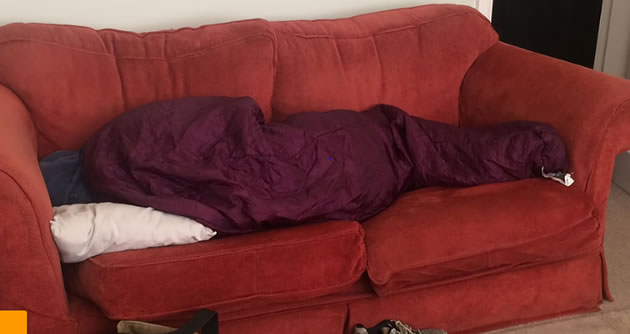Homeless Pregnant Woman Left To 'Sofa Surf' by Hounslow Council
Changes made to application process following Ombudsman investigation

Image of homeless person 'sofa surfing'
Hounslow Council has changed how it deals with homeless applications following an incident in which a heavily pregnant woman complained that she was left to ‘sofa surf’.
Her complaint was investigated by the Local Government and Social Care Ombudsman who said she should not have been turned away.
The woman was seven months pregnant when she was made homeless after falling out with her parents, but instead of taking her homelessness application and offering her interim accommodation, officers gave the woman a form and asked her to return with further documents.
For the next 10 months, despite the woman making regular contact with the council, particularly after her baby was born, the Ombudsman found the council left her to sleep on friends’ sofas.
The Ombudsman’s investigation found the council at fault for not taking the homeless application and for the poor quality of records kept on the woman’s case file.
Because the council did not take a homelessness application or give her a decision on her homelessness status, it denied the woman the right of review in court. It still had not taken a homelessness application from her more than a year after she first approached the council.
It was only after the Ombudsman started investigating, that the woman was offered - and has now accepted - permanent social housing.
Michael King, Local Government and Social Care Ombudsman, said, “Hounslow council had a duty to take a homelessness application from this woman when she initially presented herself as homeless. She should not have been turned away – she was vulnerable as a heavily pregnant woman turned out of her parental home. The council should not have needed more proof.
“I welcome the council’s readiness to remedy the case and welcome its willingness to work with us to improve complaint handling going forward. I hope the lessons learned will ensure other vulnerable people will not be put into the same position as this woman in future.”
The woman was first made homeless in May 2017, but was repeatedly told to return with documents, which she then provided. She was told there was no accommodation in the area, but she did not want to move out of the area as she needed to attend hospital appointments because there were concerns about the baby.
For five months, the woman kept in touch with the council but every time it told her it would be another two weeks before it could offer her local accommodation. She was also asked to consider a move to Manchester or Birmingham, but this was not realistic due hospital appointments for the baby.
After 10 months, the woman and her baby were still staying with various friends, but still the council did not take a homelessness application. The council asked her parents if they would accommodate her for six months on the condition the council would house her in Hounslow.
The council then argued that because the woman was living with her parents, she was no longer homeless or threatened with homelessness.
The Local Government and Social Care Ombudsman’s role is to remedy injustice and share learning from investigations to help improve public, and adult social care, services.
In this case the council agreed to apologise and pay the woman £3,500 for the injustice it caused in the 10 months she was homeless.
The Ombudsman has the power to make recommendations to improve a council’s processes for the wider public.
Hounslow council agreed to review its procedures and tell the Ombudsman what action it would take to ensure it takes a homelessness application as soon as someone approaches it as homeless.
The Council had to tell the Ombudsman what action it would take to ensure it meets its legal duties to find accommodation for homeless applicants and provide evidence it is fulfilling its duties to homeless applicants who have approached it since 3 April 2017.
The Council accepted that there was a period of time when Miss X stated she was sofa surfing, prior to returning to her parents’ home, when a homeless application should have been taken and the recommendations in the Ombudsman report relate to this issue.
The Council said it had made service improvements, including a restructuring of its delivery model, new procedures with a revised front line duty system, where anyone approaching the Council as homeless see its HIPS (Homelessness, Independence and Preventative Service).
A new IT system has been implemented to record homelessness casework and provide management oversight and reporting on homelessness applications. The supply for emergency accommodation has been increased. Staff have been sent for training.
February 17, 2019